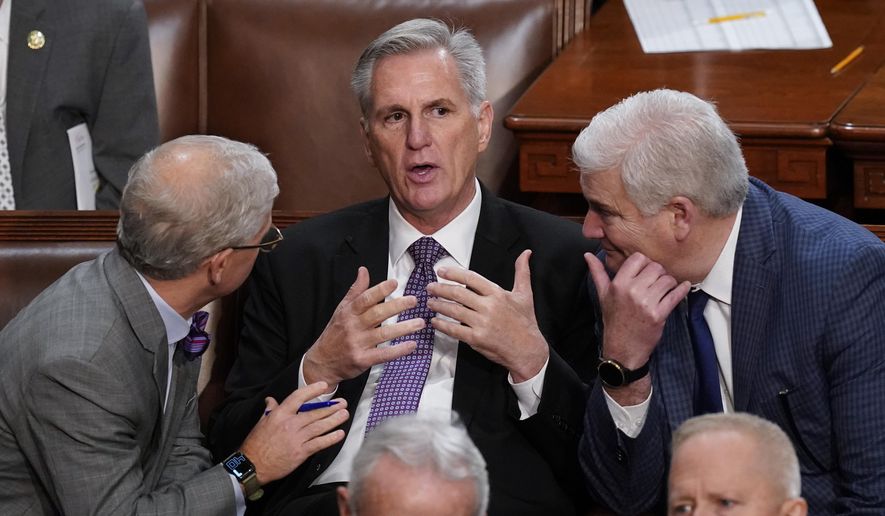House Republicans said they stand by Speaker Kevin McCarthy’s decision to end pandemic-era proxy voting, even though just a handful of absent GOP lawmakers will threaten their slim majority.
Republicans surveyed by The Washington Times said they’re glad remote voting is over.
“Proxy voting is an unconstitutional abomination,” said Rep. Mike Gallagher, Wisconsin Republican. “It’s inconvenient. I get it, but we’re doing the people’s work.”
Mr. McCarthy, of California, has been hell-bent on ending proxy voting since Democrats took the historic vote in May 2020 to end the centuries-old requirement.
Mr. McCarthy unsuccessfully challenged the proxy voting allowance in court. When he took the speaker’s gavel earlier this month, he quickly ended the practice.
But Mr. McCarthy may be in for a headache if more than a few lawmakers can’t show up to work while Republicans are trying to pass legislation that won’t get any support from Democrats.
Republican numbers are already shrinking — they hold a five-seat majority but will have to do without Rep. Greg Steube, a Florida Republican, who will be absent for several weeks while he recovers from falling off a ladder.
Rep. Glenn Grothman, Wisconsin Republican, said restoring the chamber’s longstanding tradition of in-person voting was worth the risk.
“To a degree, we are rolling the dice, that if five or six people are not here at once they aren’t all Republicans, but Kevin McCarthy is a man of his word and he’s gotten rid of proxy voting,” he said.
By the end of the 117th Congress, dozens of lawmakers regularly took advantage of voting remotely, both Democrat and Republican. While they were required to file a letter with the House clerk certifying their absence was due to the COVID-19 pandemic, many skipped votes for reasons entirely unrelated to health. Some were on vacation, others were campaigning and more than a few skipped out early at the end of the week.
While Mr. McCarthy never dropped his criticism of the practice, the proxy voting rule helped then-Speaker Nancy Pelosi function with her slim majority. Several Democratic lawmakers suffering from cancer and other illnesses were absent voted by proxy.
It also became harder for Republicans to criticize proxy voting when many in their party took part in it.
Under the proxy voting allowance, a member could ask another House lawmaker present on the House floor to vote on their behalf. Democrats also voted to allow committees to meet remotely and to allow any lawmaker to vote remotely on committees.
Now that proxy voting on the House floor and remote committee voting is prohibited again, lawmakers who can’t physically be in Washington won’t be able to do their job.
“Effective immediately, members of Congress have to show up to work if they want their vote to count,” Mr. McCarthy said when announcing the new rule earlier this month.
Still, it could throw a wrench into the GOP’s legislative agenda.
House Republicans are already struggling to corral the votes to pass a crime bill and a border security bill that they had hoped to pass quickly after taking the majority.
Republicans have 222 seats, compared to 212 Democrats. They’ll need 217 votes to pass any piece of legislation in Mr. Steube’s absence, which means they can only lose four votes to greenlight a bill if all other lawmakers vote.
While most Republicans acknowledged that ending proxy voting may challenge them, several stuck to their guns on their belief that it should never have been allowed.
“It certainly makes it more difficult,” said Rep. Bill Huizenga, Michigan Republican. “If you look at what happened with Greg Steube, when you have an accident like that or you have something like that, that’s life, but that’s how the House has operated for 116 Congresses. It wasn’t until Pelosi changed the rules on that.”
Mr. Huizenga emphasized that he was one of a handful of Republicans who never voted by proxy.
Though House Republicans often vocalized their opposition to it, more than a dozen used it at least 100 times while it was allowed. Among those who often voted by proxy are Reps. Russ Fulcher of Idaho, Patrick McHenry of North Carolina, and GOP Conference Chairwoman Elise Stefanik.
Mr. Steube also voted proxy over 100 times.
For more information, visit The Washington Times COVID-19 resource page.
• Mica Soellner can be reached at msoellner@washingtontimes.com.




Please read our comment policy before commenting.